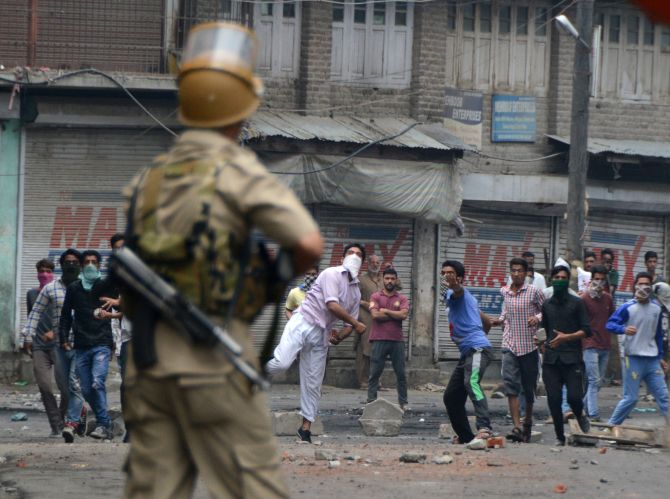India buries terrorists in anonymity
The grand funerals of terrorists in Kashmir had become a major worry for Delhi as these turned out to be events for further recruitment of terrorists

By Aasha Khosa
The funeral of Riyaz Naikoo, commander of the outlawed Hizbul Mujahideen (HM), who was killed by an assault team of the Indian Army and Jammu and Kashmir police in his native south Kashmir village on Wednesday, May 6, was a quiet affair. A few members of his family, an imam and policemen on duty were present when his body was lowered in a grave at a non-descript spot along the highway to Ladakh; no epithet declaring him a ‘shaheed’ (martyr for Islam) will adorn his grave.
In comparison, his predecessor Burhan Wani’s burial, four years ago, was a grandiose affair: thousands of mourners including the gun-wielding terrorists attended it. Their fiery speeches and a righteously revengeful mood motivated many others after him to pick up guns turning south Kashmir into a hotbed of terrorism. HM supporters had also succeeded in bringing life to a complete halt for five months across Kashmir.
Naikoo’s low key funeral is a major shift in the Indian government’s policy. The new one is aimed at not allowing glorification of terrorism, the perpetuation of the concept of jihad, and raising cult figures of terrorists. This change comes three decades after Pakistan- sponsored terrorism had destroyed peace in Kashmir.
In fact, besides Naikoo, three terrorists killed in south Kashmir in two different operations have been buried quietly at different places. The immediate reason cited by the government for this has been the fear of pandemic COVID-19 that is spreading fast in Kashmir. So far 22 terrorists owing allegiance to various pro-Pakistan jihadi groups have been buried quietly by the police.
Under the new protocol, the police preserve the DNA of the slain terrorists for transparency and legal purposes; a magistrate is required to be present while burial is taking place with full religious rites.
Glorifying terror
As COVID-19 rages in Kashmir with 726 confirmed cases and nine deaths at the time of writing, the security forces have intensified the hunt for terrorists. In the lockdown period so far at least 22 terrorists have been killed in firefights with the Army and security forces.
The grand funerals of terrorists in Kashmir had become a major worry for Delhi as these turned out to be great motivational events for terrorist leaders to attract young blood in to their ranks. For political and social reasons, after handing over the bodies to the families of slain terrorists, the forces left allowing people to mourn and hold burials.
Due to this, many a time the most wanted terrorists appeared in these funerals and made fiery speeches. No wonder these funeral rallies made many young men pick up the gun.
In fact, India’s security apparatus looked helplessly at the recurring phenomenon of many young men going missing after such funerals and eventually surfacing as member of terrorist groups. Many officers of the armed forces said openly that such events had turned the fight against terrorism into a zero-sum game. “We kill one terrorist after painstakingly gathering intelligence and planning a strike at his hideout and eventually his burial rally give rise to many more,” a senior police officer once said.
Without putting an end to such visible propaganda events, the gains of counter terrorism campaign cannot be consolidated, he had rued.
The speeches of terrorists on funerals went viral on social media. A video clip of an aged woman, mother of a known HM terrorist in South Kashmir, firing in the air and shouting slogans at her son’s funeral was widely circulated. In fact, it became a reason for banning the high-speed internet across Jammu and Kashmir in the wake of the August 5 move of scrapping special status of J&K.
Under the new counter-terrorism policy, the names of terrorists killed shall not be publicized through media. “We want to deprive the oxygen of publicity to terrorists,” a senior functionary said. The cyber police have increased surveillance on social media to discourage the trend of posting seditious views by netizens. After the Unlawful Activities Prevention Act became applicable to Jammu & Kashmir, police have booked many persons for their social media posts. Though many were let off after warning, cases against all the offenders have been booked.
US precedent
The demand for banning the big funerals for terrorists in Kashmir had started soon after the USA Seals buried Al Qaeda leader Osama bin Laden quietly at the sea. In Kashmir, however, the government had no courage to disrupt the trend of grandiose funerals for terrorists. Popular governments feared social backlash and unrest.
Though no authority is ready to speak, it has been learnt from reliable sources that the government would stick to the policy of no-grand-funerals for terrorists in the future, even after the pandemic is contained.
“People get used to certain practices over a period of time,” a senior authority, not willing to be named, said. He says the turnout of people for the funeral is no way suggestive of the support for terrorism as villagers do not want to be identified as not showing up at such events and face reprisal.
Security forces and the Army in Jammu and Kashmir have been arranging burials of unknown dead terrorists including some 4500 foreign mercenaries – mainly Pakistanis – who had come to Kashmir for ‘jihad,’ the religious war. Though at times, Indian authorities have asked Pakistan to claim the bodies of their nationals killed in Kashmir, Islamabad would feign ignorance and never own them.
At times the local moulvis have also refused to read the funeral prayers for the foreign terrorists and sometimes people have been unwilling to have the dead laid to rest in the local cemetery.
However, the Army and police do observe all religious practices and rituals for burying the dead terrorists.